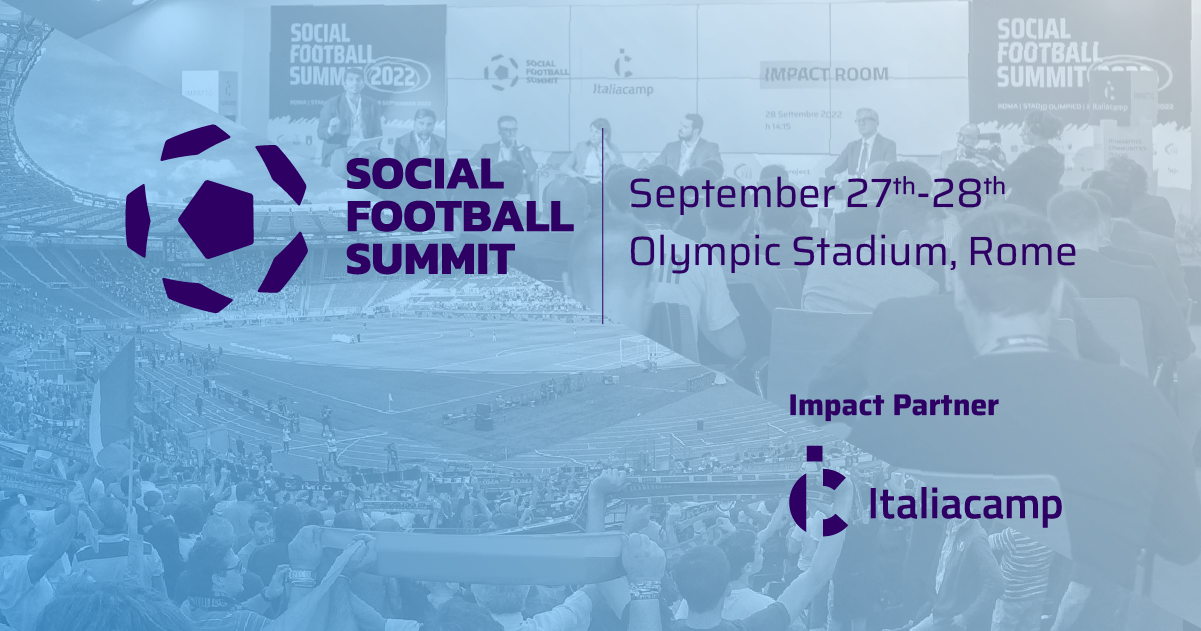28 set 2022
Italiacamp at the Social Football Summit 2022: the value (economic as well) of social impact in football.
Italiacamp presents the first comprehensive survey on league and club engagement and honours Cagliari with the Impact Award

Promoting actions and campaigns that have an impact from a social, economic and environmental point of view does the football world a lot of good, and not only in terms of reputation. This is what emerged from the Impact Room, a discussion on the role of social impact in the football system organised and coordinated by Italiacamp on the occasion of the Social Football Summit and attended by over 150 people.
As described by Leo Cisotta, Marketing & Business Development Director Italiacamp, “Clubs and leagues are increasingly attentive to social impact: Cagliari and Borussia Dortmund are two very different realities, but they do represent a concrete example of how social impact is a fundamental aspect of brand reputation and how there is no single recipe for generating social value.”
Italiacamp in fact awarded Cagliari Calcio the Impact Award SFS 22, the prize for the football club that has succeeded in integrating in its strategies, activities aimed at generating social impact for the territory, the community, the fans and all stakeholders.
Borussia Dortmund, on the other hand, represents the best practice described within “Sport Sustainability and Impact Management: an analysis of the European football industry”, the report Italiacamp realised by analysing the five main European football leagues – Premier League, Bundesliga, LaLiga, Ligue 1, Lega Serie A. Elisabetta Scognamiglio, Head of Communities Domain at Italiacamp, presented the analysis in the Impact Room: “In a true impact strategy, the generation of social, environmental and reputational value is intentional and integrated across all areas of an organisation. This is why Borussia Dortmund represents a true European best practice in our survey among the major European leagues and listed clubs.”
The research also includes data from Brand Finance, one of the world’s leading brand value consultancies. Associate Director Lorenzo Coruzzi described how fans still struggle to identify football leagues with sustainability and impact issues: a finding from their international research carried out in 2022 showed that “Only one in ten people connect football leagues to environmental sustainability and two in ten to social impact.”
Then Marco Francesco Mazzù, Professor of Marketing Practice and Director of the Master in Sport Management at Luiss University, held the baton for a testimony from the academic world: “ESG issues are central to any company. The real quantum leap that some companies are making is to integrate the issue of sustainability into everyday business life.”
Football clubs were represented by Max Van Den Doel, AS Roma Chief Marketing Officer, and Rocco Giorgianni, Secretary General of the Milan Foundation. The former dwelt on the awareness of the role that the capital city’s club has within the city and of “Having to play an active role in this city and in this community with a series of educational programmes, inclusiveness and other key social issues.” The second, on the fact that there is always a lot of pressure when it comes to sustainability in football, because “You have to meet the expectations of all stakeholders and especially the fans who want victories and trophies.” The players’ point of view was instead analysed by Fabio Poli, Organisational Director of the Italian Footballers’ Association (AIC), who spoke about the importance of creating skills for players, something made possible by the AIC’s dual-career programme.
After the Impact Room, there was a workshop in which representatives of Italian and international clubs could talk about their strategies to generate social impact by seeking strategic convergences. Participants included: Clara Simonini, Marketing & Stadium Operations, Bologna Fc 1908, Stefano D’Errico, Schools Education Coordinator Chelsea Football Club Foundation, Gianluca Pizzamiglio, Head of Marketing Udinese Calcio 1896, Elisabetta Scorcu, Head of CSR, Events and Fan Initiatives Cagliari Calcio, Elisa Persico, Head of Communication Atalanta B.C., Veronica Oldani, Commercial and Marketing Director Como 1907 and Niccolò Donna, Head of Research and Development FIGC – Federazione Italiana Giuoco Calcio.


